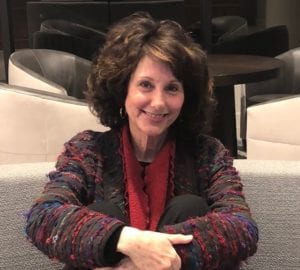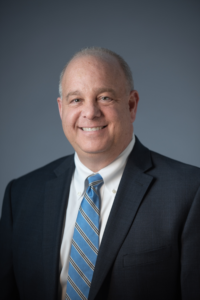“Every human being needs and deserves to feel warmth, acceptance, and support,” Maralyn says. “The most meaningful part of my job is to be a compassionate, empathic presence for the patient and family members.”
Celebrating Social Workers

In 1991, Maralyn’s 37-year-old husband died from an inoperable brain cancer, leaving her and her young son devastated and alone. Over the next months, the duo would get to deeply appreciate the hospice social workers who helped support them during their journey to find a new normal.
“Even though my husband was only in hospice for a couple of days,” Maralyn says, “the social workers were available to help me and my son get through our grief and back on our feet. I will never forget the kindness, compassion and expertise they extended to us during my husband’s dying days and beyond. And I vowed then and there that I would one day work in the field, as a means to repay our emotional debt and help others.”
Only 36-years-old at the time of her husband’s death, Maralyn made good on her promise. She obtained her Master of Social Work degree and has spent the last 18 months at Capital Caring Health, helping others going through loss.
That desire to help others is a common denominator among social workers, regardless of the setting. Members of the profession, says the National Association of Social Workers, have a strong desire to improve the lives of others, and help people overcome some of life’s most difficult challenges.
That’s certainly the case at Capital Caring Health, where our team of 60 social workers is integral to everything we do…from problem-solving with patients and caregivers in the home…to conducting workshops on aging and other topics…to providing grief support and counseling to bereaved spouses, children and community members.
For example, as a member of each dedicated patient care team, CCH social workers teach patients and caregivers coping skills, including non-medical strategies for symptom management, and help identify and coordinate additional resources they may need. They also help clarify the palliative and hospice care philosophy for patients and caregivers, helping them set goals and facilitate advance care planning to assure that patient wishes are met, now and in the future.
CCH social workers are also specially trained in advanced illness care and bereavement support., with a special sensitivity to the effect that profound personal loss can have on lives. So, in addition to individual and family grief counseling for CCH families, social workers also lead free grief support groups and workshops open to anyone in the community. As further evidence of our non-profit mission, CCH also offers community talks on topics such as caregiving for parents, aging in place, advanced care planning and others.
So, from the beginning of your CCH journey to the end, our social workers are walking right along with you, helping to pave the way for the next steps in life. It’s a role that Maralyn Farber has taken to heart.
Covid-19 Alert
Due to COVID-19, in-person counseling, support groups, and workshops have been suspended until further notice. Short-term counseling is currently available via telephone and videoconferencing. Coming soon will be the addition of both videoconferencing and telephone based support groups. You can check the status of services here, by calling 800-869-2136, or using the live chat function at www.capitalcaring.org.














 Ray Jay Garcia, M.D.
Ray Jay Garcia, M.D.



 Anne Silao-Solomon, M.D.
Anne Silao-Solomon, M.D. Matthew Irwin, M.D., M.S.W.
Matthew Irwin, M.D., M.S.W.





















 Heidi Young, M.D.
Heidi Young, M.D.
 Hank Willner, M.D.
Hank Willner, M.D.





 Lin Maurano
Lin Maurano Laura Branker
Laura Branker Cameron Muir, M.D.
Cameron Muir, M.D. Cameron Muir, M.D.
Cameron Muir, M.D. Fellowship
Fellowship Lee-Anne West, M.D.
Lee-Anne West, M.D.



 Kieran Shah
Kieran Shah Altonia Garrett
Altonia Garrett Jason Parsons
Jason Parsons Nancy Cook
Nancy Cook Michael Byas-Smith, M.D.
Michael Byas-Smith, M.D. Olubukola Bolaji, M.D.
Olubukola Bolaji, M.D. Jennifer Gerhard, D.O.
Jennifer Gerhard, D.O. Hershell Foster
Hershell Foster Michael Toohig’s Story
Michael Toohig’s Story Liberating Europe
Liberating Europe Marrygold Ugorji’s Story
Marrygold Ugorji’s Story Sherri Parker, Team Leader Medical Social Worker
Sherri Parker, Team Leader Medical Social Worker Colleen Carberry, RN Case Manager
Colleen Carberry, RN Case Manager Paulette Davidson, Chaplain
Paulette Davidson, Chaplain Donna Smith
Donna Smith Tabitha Gingerich, NP
Tabitha Gingerich, NP Dwayne Barton, NP
Dwayne Barton, NP Caitlin Geary
Caitlin Geary Sayaka Hanada
Sayaka Hanada Sherri Parker
Sherri Parker
 Mandy Brouillard
Mandy Brouillard Tamara Barnes, M.D.
Tamara Barnes, M.D. Alan Goldblatt, M.D.
Alan Goldblatt, M.D. Amanda Keerbs, M.D.
Amanda Keerbs, M.D. Adam Knudson, M.D.
Adam Knudson, M.D. Peyman Mamdouhi, D.O.
Peyman Mamdouhi, D.O. John McCue, D.O.
John McCue, D.O. Christopher Pile, M.D.
Christopher Pile, M.D. Maleeha Ruhi, M.D.
Maleeha Ruhi, M.D. Mohammad Saleem, M.D.
Mohammad Saleem, M.D. Jason Sobel, M.D.
Jason Sobel, M.D. Carolyn Richar
Carolyn Richar Susan Boris
Susan Boris Keith Everett
Keith Everett Vivian Hsia-Davis
Vivian Hsia-Davis David Schwind
David Schwind Eric De Jonge, M.D.
Eric De Jonge, M.D. Melissa McClean, N.P.
Melissa McClean, N.P. Shaz Anwar, D.O.
Shaz Anwar, D.O. Petros
Petros  Neil Parker’s Story
Neil Parker’s Story Sulaiman Bangura’s Story
Sulaiman Bangura’s Story Steven Skobel’s Story
Steven Skobel’s Story